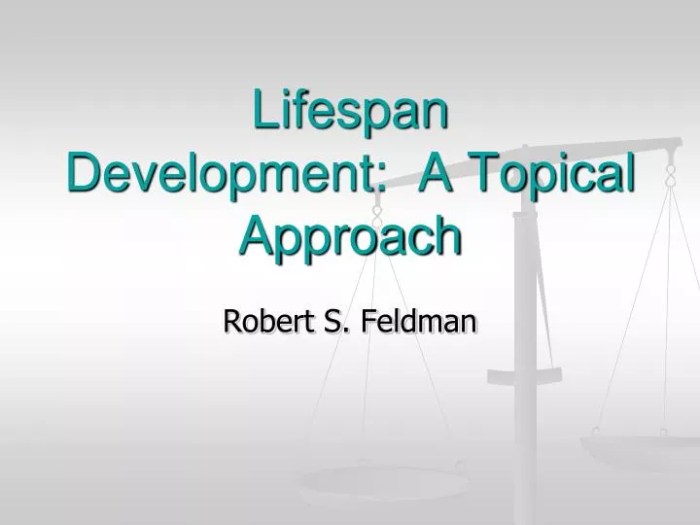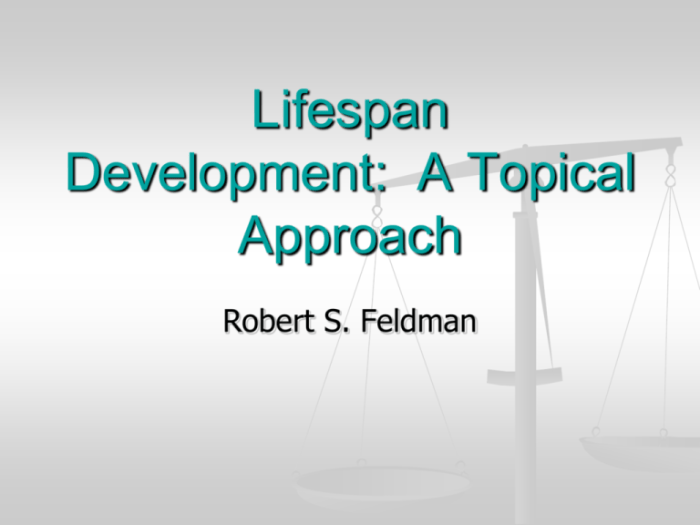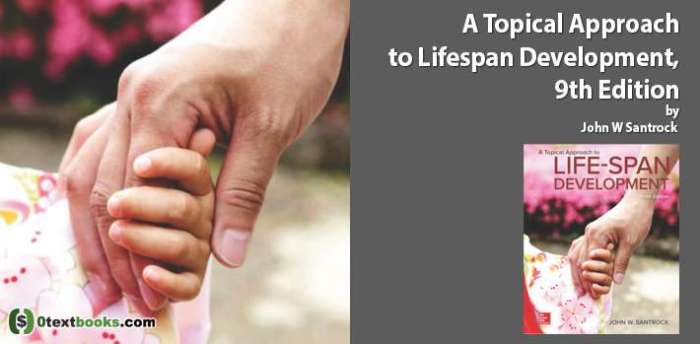A topical approach to lifespan development 11th edition – A Topical Approach to Lifespan Development, 11th Edition embarks on a captivating exploration of human development, unraveling the intricate tapestry of biological, cognitive, social-emotional, cultural, and contextual influences that shape our lives from conception to old age. This comprehensive and engaging text invites readers to delve into the complexities of human growth, empowering them with a profound understanding of the factors that mold our experiences and shape our destinies.
Through a topical lens, this 11th edition provides a structured and coherent framework for understanding lifespan development, highlighting the interplay between different domains and perspectives. By examining the major theories and research findings in each domain, readers gain a comprehensive view of the field, fostering a deeper appreciation for the multifaceted nature of human development.
Overview of a Topical Approach to Lifespan Development, 11th Edition: A Topical Approach To Lifespan Development 11th Edition
A topical approach to lifespan development organizes the study of human development around specific themes or topics. This approach allows researchers and educators to focus on particular aspects of development, such as physical health, cognitive abilities, or social relationships, across the entire lifespan.
Benefits of a Topical Approach, A topical approach to lifespan development 11th edition
- Provides a comprehensive overview of a specific topic across the lifespan.
- Facilitates comparisons and contrasts between different stages of development.
- Helps identify patterns and trends in development.
- Enhances understanding of the complex interactions between biological, cognitive, and social-emotional factors.
Limitations of a Topical Approach
- Can lead to a fragmented understanding of development.
- May overlook individual differences and variations within each topic.
- Can be challenging to integrate research findings from different topical areas.
Biological Perspectives on Lifespan Development

Biological perspectives emphasize the role of genetic, evolutionary, and epigenetic factors in shaping development. These perspectives provide insights into the biological mechanisms underlying physical, cognitive, and social-emotional changes throughout the lifespan.
Major Biological Theories
- Genetic theories:Focus on the role of genes in transmitting traits and characteristics from parents to offspring.
- Evolutionary theories:Examine how evolutionary forces, such as natural selection, have shaped human development.
- Epigenetic theories:Investigate how environmental factors can influence gene expression without altering the DNA sequence.
Cognitive Perspectives on Lifespan Development

Cognitive perspectives focus on the development of mental processes, such as learning, memory, problem-solving, and decision-making. These perspectives provide insights into how cognitive abilities change and develop across the lifespan.
Major Cognitive Theories
- Piaget’s theory of cognitive development:Proposes that cognitive development occurs through a series of distinct stages, each characterized by different ways of thinking and reasoning.
- Vygotsky’s sociocultural theory:Emphasizes the role of social interactions and cultural tools in shaping cognitive development.
- Information-processing models:Simulate the human mind as an information-processing system, focusing on how information is acquired, stored, and retrieved.
Social-Emotional Perspectives on Lifespan Development

Social-emotional perspectives emphasize the role of social and emotional factors in shaping development. These perspectives provide insights into how relationships, emotions, and personality develop and change across the lifespan.
Major Social-Emotional Theories
- Attachment theory:Focuses on the development of close emotional bonds between infants and their caregivers.
- Social learning theory:Examines how individuals learn social behaviors through observation, imitation, and reinforcement.
- Erikson’s theory of psychosocial development:Proposes that personality develops through a series of eight stages, each characterized by a different psychosocial crisis.
Essential FAQs
What are the key benefits of using a topical approach in studying lifespan development?
A topical approach provides a structured and coherent framework for organizing research and teaching, allowing for a deeper understanding of specific domains and their interrelationships.
How does a topical approach facilitate the integration of different perspectives on lifespan development?
By examining major theories and research findings from biological, cognitive, social-emotional, cultural, and contextual perspectives, a topical approach fosters a comprehensive understanding of the multifaceted nature of human growth.
What are the practical applications of a topical approach to lifespan development?
A topical approach can inform policy and practice in areas such as education, healthcare, and social work, guiding the development of interventions and programs to promote healthy development across the lifespan.